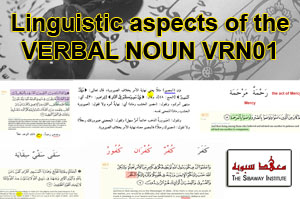VRN01 : Linguistic aspects related to the Verbal Noun

We will delve into the linguistic aspects related to the verbal noun ( Masdar). We will discuss the patterns of verbal nouns and extra meanings associated with them. We will examine the Masdar Meemee and compare it with the normal Masdar. There will be many examples from the Quran and other linguistic discussions. We will see other usages of the Masdar such as the absolute object.
This course will delve into the finer points of Classical Arabic grammar and will explain why the eloquence of the Qur’an is unprecedented and unmatched.The subjects covered in the course will be related predominately to rhetoric ( I'lmul Ma'ani) and a basic understanding of Arabic will be highly recommended.
The course is based on a number of classical Arabic Grammar and Balagha texts including: Mughnee Al-labeeb, Sharh Ibn Aqeel, Al Itqan fi ‘ulum al Qur’an by Imam Al Suyooti, Idaah fil 'uloom Al Balgha by Al Qazweeni, Sharh Al mukhtasir A'la Talkhees Al miftaah by Al Taftazani, Tafseer Fath AL qadeer by Imam Showkani, Al Bahrul Muheet by Abu Hayyan, Tafseer Abu Saud, Al Tafseer al Kabeer by Sheikh Fakhar al deen Al Razi, Fathil Qadeer by Sheikh Muhammad Al Shawkani, , Kitaab Sibawayh, Lisan Al arab by Ibn Manthoor as well as the contemporary works of Ibn Ashoor, Al sha'rawy and Dr Fadl Salih Alsamaraie.
Students can register and enrol in this course at any time. The course material can be download for future reference. The student will also have access to online teachers as well as extra lessons when they become available.
This course will delve into the finer points of Classical Arabic grammar and will explain why the eloquence of the Qur’an is unprecedented and unmatched.The subjects covered in the course will be related predominately to rhetoric ( I'lmul Ma'ani) and a basic understanding of Arabic will be highly recommended.
The course is based on a number of classical Arabic Grammar and Balagha texts including: Mughnee Al-labeeb, Sharh Ibn Aqeel, Al Itqan fi ‘ulum al Qur’an by Imam Al Suyooti, Idaah fil 'uloom Al Balgha by Al Qazweeni, Sharh Al mukhtasir A'la Talkhees Al miftaah by Al Taftazani, Tafseer Fath AL qadeer by Imam Showkani, Al Bahrul Muheet by Abu Hayyan, Tafseer Abu Saud, Al Tafseer al Kabeer by Sheikh Fakhar al deen Al Razi, Fathil Qadeer by Sheikh Muhammad Al Shawkani, , Kitaab Sibawayh, Lisan Al arab by Ibn Manthoor as well as the contemporary works of Ibn Ashoor, Al sha'rawy and Dr Fadl Salih Alsamaraie.
Students can register and enrol in this course at any time. The course material can be download for future reference. The student will also have access to online teachers as well as extra lessons when they become available.
COURSE LESSONS
Lesson 1 - The reasons why more than one verbal noun can exist for a particular root. There will be a discussion on the Quranic usage of different Masdars from the same root. [21:40 minutes]
Lesson 2 - Extra meanings associated with the Masdar patterns. We will look at a number of examples in the Quran. [19:15 minutes]
Lesson 3 - The difference between the Masdar and Masdar Meemee. Examples of their usage in the Quran. [18:28 minutes]
Lesson 4 - Further linguistic discussions of the Masdar Meemee. Perfect word choice of the Masdar Meemee in Surat Al Qiyamah and Surat Al Furqan. [17:56 minutes]
Lesson 5 - Linguistic aspects related to the Absolute Object ( Maf'ool Mutlaq). 2 different forms of emphasis: emphasis of the verb and emphasis of a sentence. Examples from the Quran. [18:46 minutes]
Lesson 6 - The Maf'ool Mutlaq that is used to clarify the type and other aspects of its agent of change. The extra meaning associated with using a Maf'ool Mutlaq that is not of the same verb type. Examples from the Quran. [16:52 minutes]
Lesson 7 - The Maf'ool Mutlaq that is used in place of a verb as a command or a supplication. The difference between using a verb, the verbal noun in the nasb state and the verbal noun in the raf'i state. Examples from the Quran. [13:20 minutes]
This is an ongoing series that will answer all student questions.
Lesson 1 - The reasons why more than one verbal noun can exist for a particular root. There will be a discussion on the Quranic usage of different Masdars from the same root. [21:40 minutes]
Lesson 2 - Extra meanings associated with the Masdar patterns. We will look at a number of examples in the Quran. [19:15 minutes]
Lesson 3 - The difference between the Masdar and Masdar Meemee. Examples of their usage in the Quran. [18:28 minutes]
Lesson 4 - Further linguistic discussions of the Masdar Meemee. Perfect word choice of the Masdar Meemee in Surat Al Qiyamah and Surat Al Furqan. [17:56 minutes]
Lesson 5 - Linguistic aspects related to the Absolute Object ( Maf'ool Mutlaq). 2 different forms of emphasis: emphasis of the verb and emphasis of a sentence. Examples from the Quran. [18:46 minutes]
Lesson 6 - The Maf'ool Mutlaq that is used to clarify the type and other aspects of its agent of change. The extra meaning associated with using a Maf'ool Mutlaq that is not of the same verb type. Examples from the Quran. [16:52 minutes]
Lesson 7 - The Maf'ool Mutlaq that is used in place of a verb as a command or a supplication. The difference between using a verb, the verbal noun in the nasb state and the verbal noun in the raf'i state. Examples from the Quran. [13:20 minutes]
This is an ongoing series that will answer all student questions.
Payment options
YOU CAN PAY SECURELY THROUGH STRIPE OR PAYPAL


